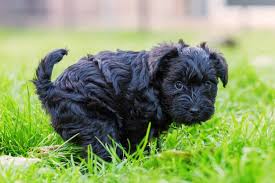Getting your pup to go when and where you want them to!
by Dr. Mikel Delgado, PhD
One of the first things to do with your new puppy is to start house training right away! This will help ensure a lifetime of success at going when and where you would prefer them to eliminate.
It’s important for young puppies to be provided with a place to eliminate (a doggie bathroom, so to speak)!
Getting started
At first, you will want to give your pup frequent chances to succeed, by taking them outdoors to eliminate SEVERAL times a day (ideally at least hourly during waking hours):
- first thing in the morning
- after every meal
- after every nap
- after playing
- any time they have been confined
- last thing before you go to bed
- at least once overnight
- anytime your pup is whining, spinning, fidgeting or sniffing (common signs that they need to eliminate)
A good rule of thumb is that pups less than 6-months old can hold their urine about as many hours as they are months old. They can usually retain urine for longer periods overnight when sleeping, but young pups will need a potty break overnight.
Where to go
It’s generally safe to take your puppy outside to eliminate if you avoid areas where other dogs toilet, especially if your puppy has not had their full set of vaccinations. Most dogs are comfortable with dirt, grass or concrete. Some may be picky, so it’s good to give them exposure to different textures when they’re ready to eliminate.
What to do
Training goes faster when you choose a spot and consistently bring them there right away. Give them about 10 minutes. If they don’t have to eliminate, bring them inside, and try again a little later.
When they start to urinate or defecate, introduce a cue word or phrase (such as “go potty”). Over time you will be able to use this phrase to ask your dog to go to the bathroom in a timely fashion.
Making it positive
Gently praise and generously reward your pup when they have finished urinating or defecating. But don’t rush your puppy back indoors. If they learn that as soon as they are done going to the bathroom, the outdoor time immediately ends, they may procrastinate so that they can extend the adventure.
Other tools for house training
Close supervision:
Supervision is key during house training.
Confinement:
In addition to the frequent trips outdoors, and praising your puppy for good behavior, help your pup get used to time in a crate.
Feeding on a schedule:
Input on a routine increases the chance of output on a routine!
What about puppy pads and litter boxes:
Some people like to use indoor training devices such as puppy pads or litter boxes during training. There’s nothing wrong with this, but your puppy may get used to eliminating indoors, which can slow down your training to get them to consistently eliminate outdoors.
Caught in the act:
If you catch your dog urinating or defecating inside, don’t panic! If possible, gently interrupt and quickly grab the leash and take them outdoors to finish.
Never punish for accidents:
The goal is to avoid accidents and provide many opportunities for your pup to succeed. Remember that puppies don’t have full control of their bladder. If your pup has an accident, NEVER scold or punish them. Urinating and defecating are never a bad thing to do – even if they might choose a place we don’t appreciate.
When are they trained?
When your pup has gone 2+ months without a mistake, they are ready for freedom! Some pups take just a few weeks, where others will need a few months to be fully house trained.

